Nigeria: News, Stories and Analysis.
Redefining Edo The Cultural Significance of Rema’s 02 Arena Performance
Nigerian singer, Rema, has been accused of Satanism because of the themes in his recent 02 performance. However, these themes are reminiscent of his Edo heritage. Read More...













